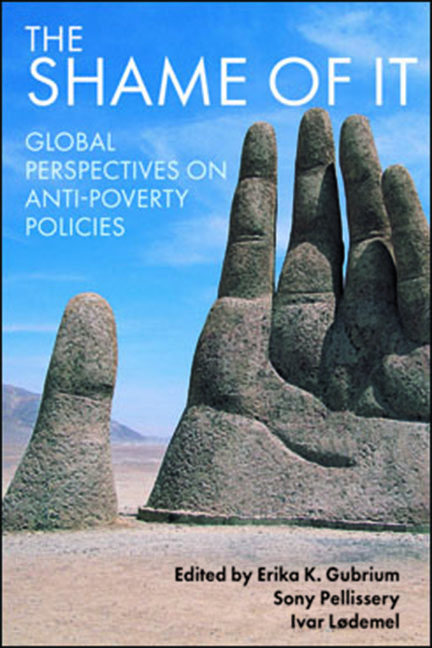Book contents
- Frontmatter
- Dedication
- Contents
- Notes on contributors
- Acknowledgements
- Preface
- one Resetting the stage
- two New urban poverty and new welfare provision: China’s dibao system
- three Thick poverty, thicker society and thin state: policy spaces for human dignity in India
- four Self-sufficiency, social assistance and the shaming of poverty in South Korea
- five ‘Not good enough’: social assistance and shaming in Norway
- six Pakistan: a journey of poverty-induced shame
- seven Separating the sheep from the goats: tackling poverty in Britain for over four centuries
- eight ‘Food that cannot be eaten’: the shame of Uganda’s anti-poverty policies
- nine Shame and shaming in policy processes
- ten Towards global principles for dignity-based anti-poverty policies
- Index
four - Self-sufficiency, social assistance and the shaming of poverty in South Korea
Published online by Cambridge University Press: 03 February 2022
- Frontmatter
- Dedication
- Contents
- Notes on contributors
- Acknowledgements
- Preface
- one Resetting the stage
- two New urban poverty and new welfare provision: China’s dibao system
- three Thick poverty, thicker society and thin state: policy spaces for human dignity in India
- four Self-sufficiency, social assistance and the shaming of poverty in South Korea
- five ‘Not good enough’: social assistance and shaming in Norway
- six Pakistan: a journey of poverty-induced shame
- seven Separating the sheep from the goats: tackling poverty in Britain for over four centuries
- eight ‘Food that cannot be eaten’: the shame of Uganda’s anti-poverty policies
- nine Shame and shaming in policy processes
- ten Towards global principles for dignity-based anti-poverty policies
- Index
Summary
South Korea was re-established in 1948 as an independent democratic nation after being annexed by Japan in 1910 for 35 years and experiencing three years of militaristic rule by the US between 1945 and 1948. However, the Korean War (1950-53) subsequently led to its partition into the Republic of Korea, better known as South Korea, and North Korea, the Democratic People's Republic. Since the end of the war, South Korea has experienced a dramatic transformation in virtually every aspect of its social and economic life. From a country characterised by abject poverty, it has become the world's 15th largest economy, with 50 million people, acquiring the status of being a long-term member of the OECD (Organisation for Economic Co-operation and Development).
National economic success is demonstrated in the lives of three generations, each generation being much better off financially than the previous one, with many individuals themselves experiencing a life that has literally taken them from rags to riches. Many have succeeded economically in an environment that has been uniquely conducive to economic success, and they are now celebrating their success through ostentatious consumption. This has fuelled a belief that economic failure and poverty equate with a person's own social failure and must be the result of personal failings. Policy continues to reflect this reasoning and often serves to reinforce the shame that people feel when they are characterised as being social failures, misfits and miscreants. This chapter first documents the economic and social transformation that has taken place in South Korea from 1953 onwards and which has shaped this conception of poverty. It then examines how such transformation has influenced the framing, structuring and implementation of social assistance provision.
Poverty in South Korea
In 1953, South Korea was ranked as one of the poorest countries in the world, with an absolute poverty rate exceeding 60-70 per cent according to some figures (PSPD/UNDP, 2000), comparable at the time to many African countries, including Uganda (see this volume, Chapter Nine). Its economy and social infrastructure was mostly destroyed during the war, creating mass unemployment, large numbers of displaced war orphans and widespread hunger. The situation was aggravated by refugees from the war returning home in large numbers, but with no means of livelihood (Ku, 2006, p 10; Kim et al, 2007, p 44).
- Type
- Chapter
- Information
- The Shame of ItGlobal Perspectives on Anti-Poverty Policies, pp. 61 - 84Publisher: Bristol University PressPrint publication year: 2013

